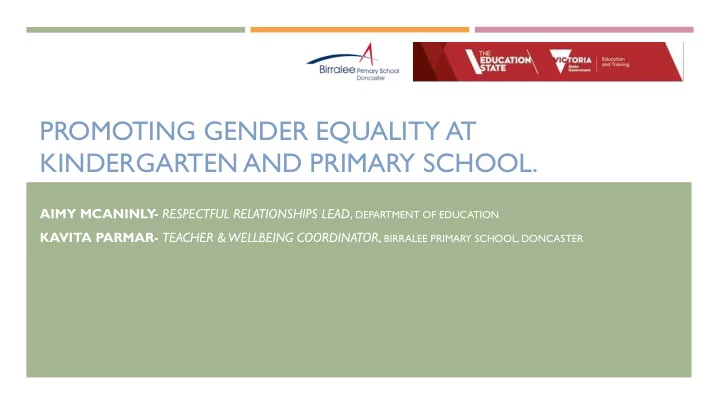

PROMOTING GENDER EQUALITY AT KINDERGARTEN AND PRIMARY SCHOOL. AIMY MCANINLY - RESPECTFUL RELATIONSHIPS LEAD , DEPARTMENT OF EDUCATION KAVITA PARMAR- TEACHER & WELLBEING COORDINATOR , BIRRALEE PRIMARY SCHOOL, DONCASTER
ACKNOWLEDGEMENTS
WHAT IS RESPECTFUL RELATIONSHIPS? Released in March 2016- A Royal Commission into Family Violence. As a Long term strategy. Whole of government approach • Whilst the causes of family violence are complex, evidence shows that stereotyped views of gender (femininity and masculinity) are one of the key drivers. • Schools play a central role in the intellectual, social and emotional development of children and young people.
WHY? Why does it matter? Gender-based violence is preventable
WHAT DOES IT LOOK LIKE IN IMPLEMENTING IN EARLY YEARS EARLY YEARS SETTINGS? Understanding and developing respectful relationships in Communication to parents early childhood Displays Supporting children to manage stress and emotions Questions at pickup and drop off Inclusive learning environments in early childhood Photos though communication apps Newsletters Each setting will implement the understandings differently. Approached through a questioning, curiosity lens. With a play-based modeling and game based approach.
WHAT DOES IT LOOK LIKE IN IMPLEMENTING IN SCHOOLS SCHOOLS? T ogether health and physical education and personal and social Communication to parents capabilities develops knowledge and skills to promote respectful Assemblies relationships that are safe and equitable. Newsletters Each School will implement the curriculum differently. Displays Information and parent info nights Approached through more direct lesson sequences, questioning, Leadership scenario and game-based approach. Supporting families and carers to understand Welcoming parent questions and feedback Supporting implementation of a whole school approach Supporting teachers to implement in their classrooms
EARLY YEARS FRAME WORK Fostering inclusion Links in with each of the outcomes: encouraging equal and respectful relationships helping children to achieve and aspire support children to grow into adults who aren’t limited by expectations based on their sex provide children with environments that encourage nongendered norms and expectations, children can feel more accepted and celebrated for their individuality
Our School Motto: Achieving excellence together Our School Declaration: At Birralee we learn to live and work together, To be responsible and to think of others, To respect our community and care for the environment, And strive to achieve our goals. WHAT DOES IT LOOK LIKE IN SCHOOLS?
WHAT WE DO IN THE CLASSROOM AT BIRRALEE PRIMARY SCHOOL? • Choice • Language • Fairness • Equal access • Equal expectations
OUR CURRICULUM We use a combined approach of teaching the Respectful Relationships and Play Is The Way programs in our Wellbeing Curriculum. A few topics we teach from Prep to Grade 2 include: Gender and Identity Exploring Gender Positive Gender Relations
PREP Curriculum Breakdown Individuality Fair and friendly play Difference between fair and violent play What gender-based violence looks like Why we wear clothes
GRADE 1 Curriculum Breakdown Comparing personal preferences Highlighting that genders don’t make a difference when working together Revisit fair and friendly play and look at conflict resolution Gender friendly classrooms
GRADE 2 Curriculum Breakdown Inclusive gender stories Witnessing gender based violence and resolving conflicts Supporting each other Personal boundaries Help-seeking
SUPPORTING RESPECTFUL RELATIONSHIPS AT HOME 1. Create a safe space where children are free to be themselves. 2. Challenge stereotypes when you hear them. 3. Talk about stereotypes. 4. Provide a range of role models through topic work, images in the classroom and external visitors. 5. Make the most of books that challenge stereotyped ideas. 6. Look at who uses which spaces and equipment to ensure all children have access. 7. Make sure there aren’t ‘girl jobs’ and ‘boy jobs’ such as admin tasks or lifting heavy equipment. 8. Pick ways to group children that don’t rely on gender. 9. Use i nclusive language rather than gendered terms of endearment or constantly referring to boys and girls. 10. Think about rewards and sanctions to ensure all children are treated equally and rewards don’t rely on gender stereotypes.
ENROLLING IN EARLY YEARS EDUCATION Research shows that kindergarten improves children’s health and wellbeing, helps them to develop strong social skills and encourages a love of learning. Children who go to a kindergarten program are more independent and confident and are more likely to make a smooth transition to primary school (Prep) T o find a kindergarten program in your local area (or area of choice) visit www.education.vic.gov.au/findaservice/Home.aspx or contact your local council, which you can find by visiting www.dtpli.vic.gov.au. Check with your council or the kindergarten on how to enrol. The Victorian Government subsidises fees for some children so they can attend kindergarten for free or at low cost in the year before they start primary school, usually when they are four years old.
RESOURCES Women’s Health East: No Limitations Guide https://whe.org.au/custom_type/no-limitations-guide/ Respectful Relationships (including Myths and Facts) https://www.education.vic.gov.au/about/programs/Page s/respectfulrelationships.aspx
Recommend
More recommend